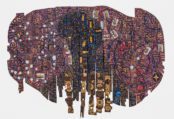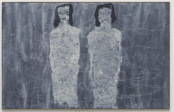Last night I was invited to a dinner hosted in Debare’s honour, to celebrate the opening of the university.
The meal was arranged by his friends and associates, all of roughly the same age, many having known each other for life, and all in positions of influence and power, whether professional or political. Often both. They regard themselves, apparently, as the new generation, the up-and-comers whose time has come. They feel that their collective rise to prominence is inevitable, that they will soon rule, and there is a sense of smug entitlement around the table.
These people make my blood boil.
The evening starts well enough. We’re in Wari’s, an Indian restaurant that is one of the nicest places I’ve yet eaten in Nigeria. The crowd (and it’s always a crowd) is about 50% ex-pats, which is remarkable compared to any other place you’d care to go, outside of the Hilton or the Sheraton. We have a long table upstairs, with 20 or so men sat around, in a mixture of traditional muslim dress and expensive suits. They regard themselves (ostentatiously) as libertarian and modern, yet the three women present have to sit at a separate table, and are only spoken to if they’re being patronised.
The conversation traces predictable patterns. Abba tells me a long anecdote about the ludicrous bureaucracy in the Ministry of Public Works in Abuja, which means that the Minister himself must sign any order – even if it is simply to change a broken light bulb from one street lamp. By the time the order is signed, a whole street is in darkness. This is par for the course – everyone, everywhere has tales like these, of laughable disorganisation, institutionalised corruption and irrational management. They are a source of amusement and head shaking “only in Nigeria” dismissals.
We discuss a former state governor, Ibori, who is awaiting extradition to the UK in Dubai on charges of money laundering, as well as being wanted in Nigeria on 109 charges of corruption, fraud and violence. The 109th charge, remarkably, relates to the $30m he offered the Financial Crimes Committee to make the other 108 disappear. He’s been convicted twice in the UK in the past – once, as a student, when working on the till at Wicke’s he allowed his girlfriend to walk out with hundreds of pounds worth of electrical equipment, and again for a slightly more glamourous fraud that remains unspecified by our narrator. He’s also previously been convicted of something in Nigeria, but amazingly managed to sidestep this on his rise to office by claiming that it was another James Ibori who had committed those offences. The courthouse where the records were stored burnt down in mysterious circumstances.
Ibori is accused of swindling $290m worth of funds from Delta state during his period in charge. His annual salary was less than $25,000. This is not considered uncommon by the men around the table. It is regarded as common practise.
A buffet is laid on for us, and amidst more tales of dastardly deeds, there are assorted perorations on Debare’s integrity, determination, munificence and general brilliance. I content myself with making suitably deferential responses to each lecture I am given – when told how well the university is going to do, for example, I reply, “with Debare leading us, I am sure we can do nothing but succeed,” or something equally trite. I discover I am good at greasing the wheels.
Despite the general air of bonhomie and friendship, this is clearly a very politically charged affair. There is an extraordinary amount of influence concentrated around this one table – political officials, bank chairmen, company CEOs, major construction firm owners, past and present permanent secretaries, incredible and ostentatious wealth. Diamond encrusted Rolexes glint from beneath religious garb. Status is inferred from the level of calculated rudeness to staff, and the extravagance of introductions. Every man I meet (the women are not considered worthy of presentation) is the head of something, or vital to something else, someone whose flesh must be pressed, elevation recognised. Handshakes are held until the initial conversation is finished, which becomes quite awkward when you are half risen, legs pinned by a low table and twisted behind or to the side, uncertain of what to say. Great strain on the thigh muscles.
There is one curious blind spot, to British eyes, to the studied economy of politeness and respect. As everywhere in Nigeria, mobile phones are never out of sight, indeed rarely out of hand. And if it rings, it is answered, whatever else is going on. This seems universally true. This morning we met with the CEO of the bank that has provided up to half the funds for the university, and on whose largesse all future plans rest. That did not stop Debare answering his phone about 10 times, albeit slightly more sheepishly than usual. I have seen the same during staff interviews, in the midst of conversations (without any acknolwedgement or apology), and at one point during this dinner, I look round to see 8 sets of eyes all glued to Blackberries, and others talking on theirs, even as someone makes a speech of congratulation. I find it truly remarkable how much time Nigerians spend on the phone – it makes the most mobile addicted teen in the UK look like an antisocial Luddite.
But the real inspiration for my anger arrives in the form of Debare’s elder brother Maduka. Fantastically late for the occasion (fully two hours) he is clearly regarded as being a level of status above those present, and he accepts the concentrated fawning of the group in a benevolently avuncular fashion. Seated with Peter and myself a discussion on the nature of education develops. Peter remarks on a school he visited recently, and how nice it was that all the children said good morning and offered to carry his bag. That is the way it should be, Maduka opines, before asking, “But what has happened to allow the education in Britain to fall to where it has? The children there are animals.” I grit my teeth.
Peter says that his father, a Local Education Officer in Sussex, was a great advocate of the abolition of the grammar school system. He thinks that if his father was around today, he would reassess his opinion, as the removal of this structure that offered the promise of academic brilliance to the top 25% has ended in the extension of mediocrity to all. Comprehensive education is, apparently, simply not up to it, not least in terms of the establishment of values, and the university system has been catastrophically diluted. Maduka agrees. He waxes lyrical about his schooldays at the “Eton of Nigeria” – “My class played Eton Fives against Prince Charles’ class – 1962.” A finger held in the air for emphasis. “Our teachers were members of the aristocracy, British, and demob’s from the First and Second World Wars. There are no men like this now, and our children suffer.”
There’s more of this, all similarly reactionary, and several times I have to almost literally bite my tongue to stop myself from jumping in. Eventually I make my excuses and go outside for a cigarette. I am almost shaking with anger. The level of patrician-like condescension has coloured the whole experience, and when I return, I feel that I am in fact with some strange Nigerian version of the Bullingdon club, only without the alcohol. In fact, in Maduka, there is something even older than that – he is what Rushdie would call one of Macaulay’s Minutemen, one of the “class of persons, [Nigerian] in blood and colour, but English in opinions, in morals and in intellect…” designed to be ”interpreters between us [the British] and the millions we govern.” Undoubtedly the “Nigerian Eton” was designed to achieve precisely such an inculcation of values, and clearly it worked.
As anyone who has ever talked to me about this will know, I despise any nostalgic evocation of the past that seeks to paint some distant point as a golden age, or the present as irrevocably broken, a dystopian, fallen world whose benighted denizens can only gaze with longing at the moral and intellectual superiority of the past. I am not attempting to deny or denigrate the qualities of colonial era education, or efface the current chaos in this country, but to hear Empire so passionately invoked, and to hear the current Nigeria so comprehensively written off makes me sick. A part of me trusts in the desire of Debare and his associates here to change and reform their country, but after meeting them I cannot help but wonder if they are the right people to bring about that change. Debare has put his money where his mouth is with the university, but elsewhere round the table business is obviously the key, and I wonder how much motivation there truly is to take on the system out of which they all do so well. I could be being unfair, and I hope I am.
All this only serves to make me more determined to do something positive here, to teach to the best of my ability, to contribute something. We are cynical of, and complacent with our advantages and hard won privileges in Britain, but we should not be. Of course, there is an irony to my proclamation there, as we are advertising ourselves as “British Style, British Standard”, and so I am, at best, a part of an enterprise that smacks of the imperialism I have just so roundly slated. But I don’t care. To quote Rushdie again, “I myself manage to hold large numbers of wholly irreconcilable views simultaneously, without the least difficulty. I do not think that others are less versatile”.

















